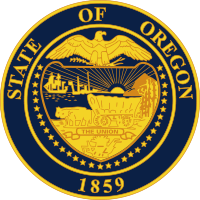Alsea
| Total population | |
|---|---|
|
1774: 3,060 | |
| Regions with significant populations | |
| Oregon | |
| Languages | |
| Alsea | |
| Religion | |
| Very little is known about Alsea religion. It is thought to be similar to that of the Coos | |
| Related ethnic groups | |
| Yaquina |
The Alsea were a Native American tribe of Western Oregon. They are probably extinct, although a few members may be mixed in with the Confederated Tribes of Siletz, many of whom live on the Siletz Reservation, where the remaining members were relocated.
Name
The name "Alsea" comes from /alsíiya/, the name applied to the Alseas by their neighbors, the Tillamook and Coos peoples.[1]
Kûnis'tûnne, Chastacosta name. Päifan amím, Luckiamute Kalapuya name. Si ni'-te-li tunne, Naltunne name, meaning "flatheads." Tcha yáxo amim, Luckiamute Kalapuya name. Tehayesátlu, Nestucca name.[2]
Geography
The Alsea lived on the western coast of Oregon, around what is now Alsea Bay at the mouth of the Alsea River.
- Villages
- Chiink, on the south side of Alsea River.
- Kakhtshanwaish, on the north side of Alsea River.
- Kalbusht, on the lower course of Alsea River.
- Kauhuk, on the south side of Alsea River.
- Kaukhwan, on the north side of Alsea River at Beaver Creek.
- Khlimkwaish, on the south side of Alsea River.
- Khlokhwaiyutslu, on the north side of Alsea River.
- Kutauwa, on the north side of Alsea River at its mouth.
- Kwamk, on the south side of Alsea River.
- Kwulisit, on the south side of Alsea River.
- Kyamaisu, on the north side of Alsea River at its mouth.
- Panit, on the south side of Alsea River.
- Shiuwauk, on the north side of Alsea River.
- Skhakhwaiyutslu, on the south side of Alsea River.
- Tachuwit, on the north side of Alsea River.
- Thlekuhweyuk, on the south side of Alsea River.
- Thlekushauk, on the south side of Alsea River.[2]
"Mooney (1928) estimates the number of Indians belonging to the Yakonan stock at 6,000 in 1780. The census of 1910 returned 29 Indians under this name, and that of 1930 only 9 under the entire Yakonan stock."[2]
Culture
The Alsea hunted seals and sea lions, and fished for salmon. Like many tribes in the area, they flattened the heads of infants.
Language
Alsea was an Alsean language very closely related to Yaquina. By 1910, it was almost extinct, with fewer than six people having a speaking knowledge of the language.[3]
Religion
Very little is known about Alsea religion. It is thought to be similar to that of the Coos.
Arts
The Alsea wore robes of seal skin, wove baskets and made grass raincoats.
References
- ↑ Bright, William (2004). Native American placenames of the United States. University of Oklahoma Press. p. 34. ISBN 978-0-8061-3598-4. Retrieved 11 April 2011.
- 1 2 3 John R. Swanton (1953). The Indian Tribes of North America. Bureau of American Ethnology Bulletin. 145. Retrieved 2012-09-04.
- ↑ Frachtenberg, Leo (1920). Alsea texts and myths. Washington, D.C.: United States Government Printing Office. p. 243.
Further reading
- Leo J. Frachtenberg, "Myths of the Alsea Indians of Northwestern Oregon," International Journal of American Linguistics, vol. 1, no. 1 (July 1917), pp. 64–75. In JSTOR.
